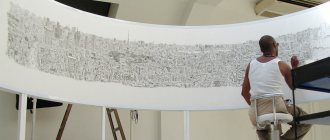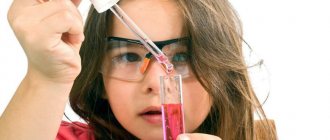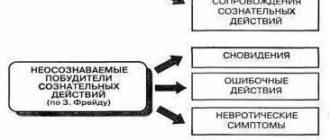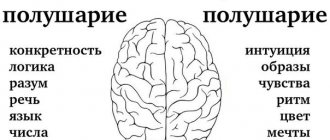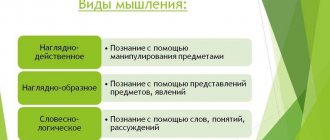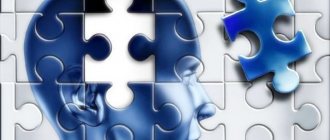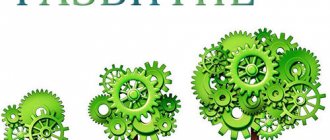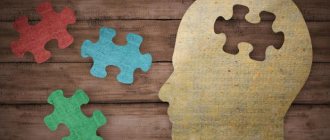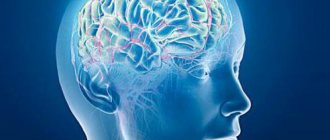Concept and meaning
Abilities are:
- Mental formations that continue to develop into old age. You cannot compare abilities with knowledge or compare these concepts, but they cannot exist without each other.
- A system of mental properties, and not just the formation of the work of consciousness. The prerequisites for the emergence of abilities are the hereditary, physiological, and natural characteristics of the body. Conditions for development - education, training, influence of society. The dominant factors influencing the speed of skill development are personal interests, societal demands, and social values.
- A complex of properties that no longer manifests itself in knowledge, skills or abilities, but in the speed of their acquisition and further development.
Thanks to evolution and the development of society, people have learned to compensate for the lack of some abilities with the high development of others.
There are no incapable people, each person has a number of talents and inclinations and capabilities that set him apart from the general crowd, but often a person is not aware of his hidden capabilities. Many teachers approach teaching children in a formulaic way, not taking into account that each child is individual. Because of this, many children feel like “black sheep” and try not to show their uniqueness, fearing condemnation from classmates and teachers. This leads to late identification of abilities.
Thanks to evolution and the development of society, people have learned to compensate for the lack of some abilities with the high development of others.
Development and formation of abilities
The abilities of each person express concentrated historical and individual experience of activity. The knowledge accumulated by previous generations constitutes the initial basis on which people can set new problems and solve them. The achieved level of knowledge and culture places new demands on a person and his abilities. What only an outstanding person could achieve in previous historical eras is now easily learned by schoolchildren.
Mastery of culture and knowledge occurs in the process of individual activity. In the course of activity, a person learns the properties of materials, the mental qualities of people, as well as his own strengths and capabilities, adjusts and adapts his powers to the requirements of the activity, and forms the missing properties in himself.
Educational activities create the opportunity not only to test the child in all respects, but also to form him comprehensively.
a special role in the development and formation of abilities . Abilities can develop spontaneously in the process of activity, but this requires more time and more effort. Training and education accelerate this process, as they eliminate the formation of unnecessary links in the mechanism of activity.
In the learning process , the child acquires two types of knowledge: about events in natural and social reality and about ways to solve theoretical and practical problems. Knowledge of the laws of reality and the historical experience of knowledge accumulated by humanity provides a person with preparedness for activity and the formation of abilities. For the formation of abilities, mastering rational ways of solving problems is of particular importance. These methods, being generalized and stereotyped, become links in abilities.
Abilities develop gradually , but unevenly. In the development of abilities, the primary factor is the gradual structuring of natural properties in relation to the requirements of activity.
Mastering knowledge and skills in the process of activity and their gradual generalization lead to the formation of special and at the same time universal mechanisms, or systems, of activity that provide solutions to increasingly complex new problems.
At the first stage of development, abilities are reproductive and imitative in nature.
Abilities develop unevenly as knowledge and experience accumulate. Musical abilities begin to develop first, then visual abilities. Poetic talent develops rapidly in adolescence; among the abilities for science, mathematical abilities develop the earliest.
Origin and study
Researchers have debated the nature of the emergence of abilities for many years. Some argued that at birth a person is a blank slate that can be directed in any direction with proper upbringing and training. Others attributed abilities to God's gift, which cannot be spoiled by training or upbringing.
Serious study begins in the 19th century. The first scientist who began to develop this topic at a scientific level was psychologist Francis Galton. He studied in depth the biography of popular people. In the course of his research, the scientist came to the conclusion that they had hereditary abilities for their favorite activity.
After the first successes in this direction, other researchers began to study the issue, among whom was Charles Spearman. He carried out an empirical study of human abilities. The psychologist was interested in applied research, and developed a series of tests that could indicate a person’s inclinations and talents. Based on the results, it was possible to understand what type of activity the individual was inclined to.
The next scientist who took a big step in developing this issue is Joy Gilford. He developed his own model, in which he indicated that ability has three qualities - product, operation, content.
Other scientists who have repeatedly addressed the development of this issue are Vygotsky, Shadrikov, Ananyev, Kholodnaya.
Structure of abilities.
The activities (work, study, etc.) that a person masters place high demands on his psychological qualities (peculiarities of intelligence, emotional-volitional sphere, sensorimotor).
These requirements cannot be satisfied by any one quality, even if it has reached a very high level of development. the opinion that a single mental property can ensure high productivity of activity and act as an equivalent of all abilities is devoid of scientific credibility. Abilities are a set of mental qualities with a complex structure. The structure of the totality of mental qualities, which acts as an ability, is ultimately determined by the requirements of a specific activity and is different for different types of activity.
A person’s abilities for a certain type of activity have a complex structure, which is a combination of mental characteristics. For example, the structure of musical abilities includes: ear for music, ability for auditory perception, musical-rhythmic sense. Literary abilities consist of the following components: a high level of aesthetic feeling, the need for self-expression, an original, perfect language, a tendency to fantasize, and a high level of development of figurative memory.
The success of a particular activity depends on a combination of abilities. In the absence of inclinations to develop any abilities, their deficit can be compensated for by developing other abilities, either through the acquisition of skills, or through the formation of an individual style of activity. This kind of “substitution represents the compensatory capabilities of the psyche.
Types and structure
Abilities have a complex structure. Inclinations in psychology - anatomical, physiological, psychophysiological features. Characteristic:
- Temperament can become a predominant factor in choosing a profession. Phlegmatic people are successful in one area, sanguine people in another.
- The inclinations include the innate characteristics of the sensory system. If a person distinguishes colors and shades well, he can become an artist.
Makings do not affect a person's life path. Peculiarities:
- Only with active activity can a subject develop potential and manifest it. If a person wants to become a musician, he practices playing musical instruments; to become an artist, the individual tries to create paintings.
- Mastering the activity. If a person has the inclination to work with wood, but he is not trained in various processing methods and working with hand tools, he will never become a carpenter.
The learning process must begin in childhood.
Peculiarities:
- There are types of activities for which a person shows a strong inclination. He wants to do them as much as possible, without paying attention to other important matters. Inclinations allow you to achieve results in a certain direction, since the individual will go through obstacles to achieve the desired result.
- In addition to real ones, there are imaginary inclinations. More often these are desires caused by feelings of envy.
In psychology, there are two types of abilities:
- General - intelligence, memory, attention. Their development is influenced by perseverance, independence, and determination.
- Special - associated with a specific type of activity. Develop quickly with practice.
Stages of development of inclinations:
- Reproductive - when learning, a person performs patterned actions. In this situation, a person can become a master in a field of interest to him, but his manipulations will be standard.
- Creative - with the development of inclinations, an individual moves away from imposed stereotypes and standards and comes up with his own scenario of actions. Such people reach great heights and are distinguished by extraordinary thinking.
Alternative view
Developing psychic abilities can completely change your life for the better! Read the details now!
Imagine... that you can predict the future and see the past, make accurate forecasts in currency markets and sports matches, find hidden treasures - gold, money, stocks, missing things, win the lottery, read information hidden from you, expose lies and betrayal and learn everything you need without books or the Internet!
—
All this can lead to the development of mental abilities!
What are psychic abilities?
Every person has psychic abilities. But these abilities themselves are very diverse!
Types of psychic abilities!
Perception Abilities:
Promotional Video:
- clairvoyance,
- clairaudience,
- empathy,
- ethereal sense of smell and touch,
- psychometry,
- future prediction,
- intuition.
And abilities associated with our subtle body:
- mental travels,
- astral exit,
- lucid dreaming,
- mediumistic abilities
This includes the management of energy and matter:
- telekinesis,
- levitation,
- teleportation,
- materialization/dematerialization of objects
Mental abilities also include reading information and comprehending higher knowledge.
How to develop the desired abilities and activate your potential?
It is known that abilities can be trained in the same way as muscles! From experience, the recommendations you will learn about further can significantly expand your creative potential!
How to develop psychic abilities through meditation?
Experienced practitioners claim that meditation¹ accelerates the development of psychic abilities.
There is no specific way to meditate; the most important thing in this activity is to concentrate and relax as deeply as possible.
When meditation becomes daily, a person begins to feel better about his energy (both physical and spiritual). Spiritual energy connects consciousness with the subconscious and unconscious. The stronger this connection is, the faster psychic abilities will manifest themselves.
A meditative state is key to increasing a person's physical and spiritual energy. It helps in many difficult life situations.
And even for children!
For example, if your child has difficulty reading, teach him meditation, and everything will work out. The child’s brain will come into a harmonious state, concentration will increase, memory will improve, and the baby will begin to read fluently and expressively.
How does the world around us help in the development of mental abilities?
When you wake up early in the morning, do not rush to jump out of bed in order to quickly plunge into the usual bustle of the day. Lie down for a few minutes with your eyes closed, come to your senses, listen to the sounds and smells. Perhaps some images or signs will appear before your closed eyes that will be a hint or warning from your subconscious.
As practice shows, regularly performing this simple exercise strengthens intuition and sharpens the perception of the world around us.
Dreams as a way to receive information!
If you often have vivid dreams, then you should pay attention to them! It is possible that your unique ability is to receive information through dreams.
By remembering and recording dreams in full detail, and then analyzing them, you can see their connection with everyday life. Working with dreams allows you to learn how to read information and receive warnings, tips, advice...
How does communication with nature affect psychic abilities?
The absence of fuss and noise has a beneficial effect on thought processes, especially on the ability to concentrate and mental stability.
It is known that unity with nature, birdsong, the sound of a waterfall, the rustling of leaves (natural, natural sound background) contribute to the development of mental abilities and intuitive perception.
Tips for those who want to activate and develop psychic abilities
- Listen more often to your inner voice and be guided by it when making decisions.
- Pay attention to sudden thoughts and sensations.
- The development of the mental abilities of the brain can be accelerated by using hypnosis sessions.
- The more practice, the better the result will be. The effect of the exercises does not appear immediately.
- Before developing this or that superpower, you need to accept it within yourself, believe in its reality.
Thus, official science does not yet accept clairvoyance, telepathy, healing and other superpowers as really existing, but people’s experience convinces them otherwise. The main thing is to believe in their existence and the possibility of their development within yourself.
On our website you can find methods for developing all mental abilities!
Characteristic signs
There are a number of characteristic signs of abilities that will help distinguish them from inclinations, inclinations and talents:
- willingness to overcome problems and obstacles on the way to the intended result;
- high learning speed;
- a unique approach to doing things;
- obtaining original results;
- motivation for the chosen activity;
- a large reserve of energy to complete assigned tasks - an enthusiastic person does not feel tired.
Diagnostics
You can get information using tests. They can be general or highly specialized.
First, the individual must pass general tests so that the researcher understands which properties predominate in him. Testing requirements:
- standardization - the procedure must be uniform in order for the results to be reliable;
- reliability - questions must be tested in practice;
- unbiased attitude towards the subject on the part of the researcher.
The results obtained are announced, and other tests are compiled on their basis.
When determining creative inclinations, it is necessary to take into account the characteristics of creativity:
- semantic flexibility;
- creative thinking;
- originality of associations.
Diagnostics of abilities
Identifying abilities is still one of the most difficult tasks in psychology. At different times, many scientists put forward their own methods for studying this quality. However, at present there is no technique that allows one to identify a person’s ability with absolute accuracy, as well as determine its level.
The main problem was that abilities were measured quantitatively, and the level of development of general abilities was derived. However, in fact, they are a qualitative indicator that must be considered in dynamics. Various psychologists have put forward their own methods for measuring this quality. For example, L. S. Vygotsky proposed assessing a child’s abilities through the zone of proximal development. This involved dual diagnosis, where the child solved the problem first with an adult and then independently.
Another method of measuring abilities using testing was proposed by the founder of differential psychology, the English scientist F. Galton. The purpose of the technique was to identify not only the presence of ability, but also the level of its development. First of all, the levels of development of intellectual abilities were studied using tests for general intelligence, then the subject answered a block of questions that revealed the presence of special abilities, as well as their level.
The following diagnostic method belongs to the French scientists A. Binet and Simon. Here, too, the level of intellectual abilities was first determined using 30 tasks, arranged in ascending order of difficulty. The main emphasis was on the ability to understand the task and be able to reason logically about how it could be solved. Scientists assumed that this skill underlies intelligence. They own the concept of mental age, which is determined by the level of solving intellectual problems. Each completed task was a criterion for determining this indicator. After the death of the scientists, the tests were translated into English and presented in the United States. Later, in 1916, the American scientist Lewis Terman modified the test, and the new version, which was given the name “Standward-Binet scale,” began to be considered a universal method for identifying abilities.
There are many methods for identifying specific abilities, but they are all based on determining intellectual indicators in the first place. This is due to the opinion of scientists that in order to develop creative and other abilities, the level of intellectual development must be above average.
Development methods
Development of abilities in children:
- A game. You need to play with the child so that he tries on the roles. In the future, he himself will begin to choose the characters whose roles he wants to play.
- Individuality. The teacher helps the child choose a club that interests him, and enroll in a sports section if there is an urge. Parents should approve of his intentions and not interfere with the development of individuality.
- Height. The child must take part in competitions, competitions, and performances related to his favorite activity. This way the baby will be able to feel the first notes of glory, the taste of victory, and the bitterness of defeat.
- Mastery. It comes after training and knowledge of the sphere. If a child does not stop in the face of failures and difficulties, he can achieve great heights.
When identifying a direction of interest, it is necessary to regularly practice, try to acquire new knowledge and skills, so that the development is active and bears fruit.
Issues
Many psychologists have studied the problems of developing abilities. They tried to answer the question why some people develop quickly and reach great heights, while others cannot find themselves throughout their lives. Based on the ongoing research, several methods have been compiled that allow you to find a hobby and develop talents.
Abilities should not be confused with inclinations or talents. Makings is a “dormant” potential that may not be revealed until the end of life. Talents will break through, no matter what a person does. Abilities help an individual develop in an area of interest.
